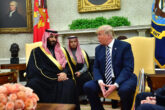October 28, 2019
Why corporate America needs to have a code of conduct for China
The dispute between China and the National Basketball Association after Houston Rockets general manager Daryl Morey tweeted support for the Hong Kong protestors is the highest profile in a string of cases of the Chinese bullying American companies. China made Marriott apologize last year after a customer survey listed Taiwan, Tibet, and Hong Kong as separate countries, and China also required United States airlines to stop listing Taiwan as a separate country on their websites. This bullying fits right into a growing global practice of China demanding multinational companies toe its political line if they want to remain in its vast market.
As the United States and China enter this era of strategic competition, American companies face growing pressure from their own government over business in China. Congress and the administration are concerned that American technology may be facilitating Chinese activities that threaten United States national interests, from modernization of the Chinese military to the growing mass surveillance state and detention of more than a million Uighurs in Xinjiang province. There is increasing support across Washington for new export controls and sanctions that could sharply crimp the ability of American companies to sell their products to China, which is the second largest market in the world.
Corporate America needs to stand up to Chinese bullying and get ahead of government regulations by taking the approach that companies have successfully taken in other contexts and adopting voluntary corporate commitments to resist Chinese bullying while refraining from selling products and services to Chinese companies and government agencies that challenge the values and interests of the United States. American companies therefore need a corporate code of conduct for China.
Read the full article and more in The Hill.
More from CNAS
-
Game Over?
The trade wargame suggests that sustained high tariffs could create leverage and urgency to spur action toward a productive restructuring of the international trade system....
By Emily Kilcrease & Geoffrey Gertz
-
Middle East Security / Energy, Economics & Security
Trump Inks $600 Bn Deal In Saudi Arabia | Musk, Blackrock CEO Flank Trump In Gulf VisitIn today's episode of India Global, U.S. President Donald Trump secured a $600 billion commitment from Saudi Arabia on Tuesday to invest in the United States. NDTV's Gaurie Dw...
By Daniel Silverberg
-
Energy, Economics & Security / Technology & National Security
Tariffs and Tech: An Uncertain RecipeHigher tariffs could prompt American cloud companies to shift more of their capital investments abroad....
By Pablo Chavez
-
Trump Tariffs: How Will U.S. Plans Reshape the Global Economy?
Donald Trump says he's already decided the tariffs he will impose on countries that export goods to America, including the United Kingdom. Channel 4 hears from Emily Kilcrease...
By Emily Kilcrease




